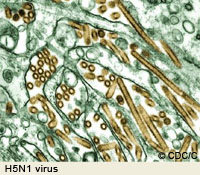Science Academies call on G8 not to lose focus on disease
Science academies from 12 countries have called on world leaders, particularly G8 leaders, to not let the current interest in avian flu distract from ongoing work in eradicating established diseases, particularly tuberculosis (TB), malaria and HIV/AIDS. They call on the G8 group, of which the EU and four of its Member States are members, to introduce global strategies to tackle all existing and emerging diseases. The group will meet in St Petersburg between 15 and 17 July. Martin Rees is President of the UK's Royal Society, one of the report's signatories. 'There is a pressing need for closely coordinated, international planning and surveillance to address the current threat of an influenza pandemic. It is also crucially important for the global community not to forget that, at present, avian influenza is not the most significant disease concern for people globally. It is other emerging diseases and existing infectious diseases such as tuberculosis, HIV/ AIDS and malaria which are causing widespread illness and severe economic harm to developing countries,' he said. Diseases such as TB, malaria and HIV/AIDS are already a huge burden on the countries affected. It is a cruel irony that the countries worst affected are generally also the countries that can least afford to deal with the problem, placing a double economic burden on them. 'The ongoing fight against avian influenza is essential, and will hopefully act as a catalyst to improve the planning, monitoring and response to the threat of other global emerging or re-emerging diseases. Many of the issues relevant to avian influenza, such as improved monitoring of potential human and animal disease sources and human illness hotspots and planning for the production and distribution of adequate vaccines in the case of a pandemic, are applicable to a number of diseases,' said Dr Rees. 'We would urge governments to consider this disparity between developing and developed countries and adapt international monitoring systems accordingly, to ensure they are capable of tackling current and future threats whilst maintaining economic growth and sustainable development,' he said. The signatories provide six recommendations for dealing with avian flu: - Support established international initiatives on avian flu, set out by the World Health Organisation, the World Organisation for Animal Health, the United Nations Food and Agricultural Organisation and the World Bank. Individual states should pay close attention to these initiatives when organising their own strategies. - Provide developing nations with support in developing their own strategies and infrastructure for dealing with avian flu and other diseases, particularly in detection and monitoring, as many countries simply do not have the funds or capacity to take action. - G8 governments should obtain independent advice on global surveillance strategies, and implement a coordinated strategy. - Put resources into developing new types of vaccines and explore the links between animal to human transmission. - States should collaborate and share information on outbreaks and develop a strategy to do so efficiently. - All the strategies for dealing with avian flu are applicable and relevant to other infectious diseases, and resources to avian flu should complement, not compete with funds already devoted to dealing with diseases such as HIV/AIDS, TB, malaria and ebola. The signatories represent national science academies in Brazil, Canada, China, France, Germany, India, Italy, Japan, Russia, South Africa, the UK and US.
Countries
Brazil, Canada, China, Germany, France, India, Italy, Japan, Russia, United Kingdom, United States, South Africa



